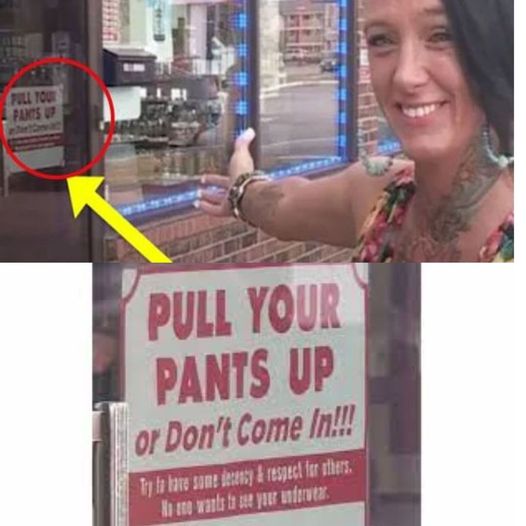In a small town in Oklahoma, Midwest Wine and Spirits, a local liquor store, recently found itself at the center of a heated debate. The store put up a sign that read: “Pull your pants up or don’t come in,” accompanied by a secondary message, “Try to have some decency and respect for others. No one wants to see your underwear.” What might seem like a harmless request to some has ignited a firestorm of controversy and discussion on social media, with many questioning whether the store was right to impose its dress code.
The sign, meant to discourage the popular style of sagging pants, quickly went viral after being posted online. Some people supported the store’s stance, arguing that businesses have the right to set standards for customer behavior and appearance. Others, however, viewed the sign as offensive and discriminatory, particularly towards young men of color who are often associated with the sagging trend.
Chad Gilbert, one of the store’s managers, defended the sign in the face of criticism. “I realize wearing pants low is a fashion statement for some, but it doesn’t work for me and I find it somewhat offensive,” he said. Gilbert’s comments suggest that the sign was more about personal taste than any broad social or moral statement. However, this hasn’t stopped critics from voicing their concerns.
The controversy highlights a broader cultural tension between personal expression and public decency. In many communities, sagging pants have become symbolic of youth rebellion and urban culture. To some, it’s a harmless fashion choice; to others, it represents a lack of respect for traditional values. The debate isn’t new—sagging pants have been a point of contention in American society for decades, with some cities even attempting to pass laws banning the style.
The situation in Oklahoma is a microcosm of this larger debate. While some applaud the liquor store for taking a stand, others see it as an unnecessary imposition on personal freedom. The store’s policy, they argue, perpetuates negative stereotypes and unfairly targets a specific demographic.
One local customer, Sunshine Weatherby, shared her thoughts on the matter, saying, “I can see that if it was like a church. There are families there, you might have a problem with that, but this is a liquor store. I’ve seen worse at a liquor store.” Weatherby’s comment underscores the subjective nature of what is considered “appropriate” attire and raises questions about where the line should be drawn.
The incident also touches on the broader issue of how businesses should navigate the increasingly complex landscape of social norms and customer expectations. In an era where a single social media post can spark widespread backlash, companies are finding it more challenging than ever to balance their own values with those of their customers.
On the one hand, businesses like Midwest Wine and Spirits may feel justified in setting certain standards for their clientele. On the other hand, they risk alienating customers and attracting negative attention if their policies are perceived as overstepping boundaries or being discriminatory.
The rapid spread of the story on social media highlights how quickly local issues can escalate into national debates. What started as a simple sign in a liquor store window has now become a talking point across the internet, drawing opinions from people far beyond the town of Midwest City, Oklahoma.
The situation also serves as a reminder of the power of social media to shape public discourse. In the past, a sign like this might have gone unnoticed or only sparked a small, local discussion. Today, however, such actions can quickly become part of a much larger conversation, with people from all walks of life weighing in.
As the debate continues, it raises important questions about the role of businesses in policing customer behavior. Should businesses have the right to enforce dress codes that reflect their own values? Or does doing so cross a line into unfair discrimination? These are questions that are likely to be debated for years to come, as society continues to grapple with issues of personal freedom, cultural expression, and social responsibility.
In the end, the controversy surrounding Midwest Wine and Spirits is more than just a debate about sagging pants—it’s a reflection of deeper societal tensions and the ongoing struggle to find a balance between individual rights and community standards. Whether the store’s sign was a reasonable request or an overreach is ultimately up to each person to decide, but one thing is clear: in today’s hyper-connected world, even the smallest actions can have big consequences.

